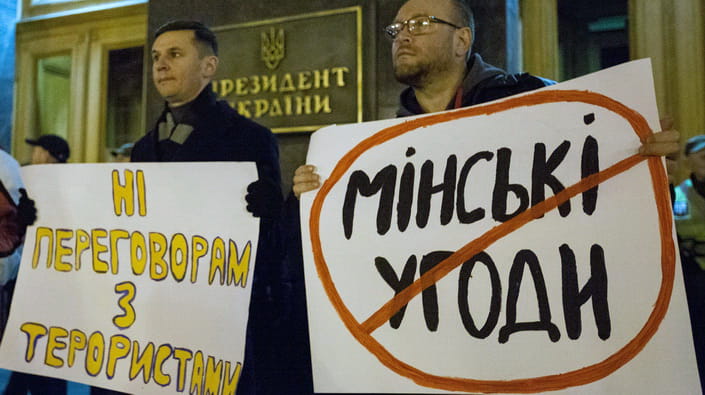The Rating Group's data shows that the number of Ukrainians who want the Minsk accords revised steadily grows year by year, while the unpopular opinion that Ukraine should fully comply with the deal's paragraphs gradually becomes even more unpopular.
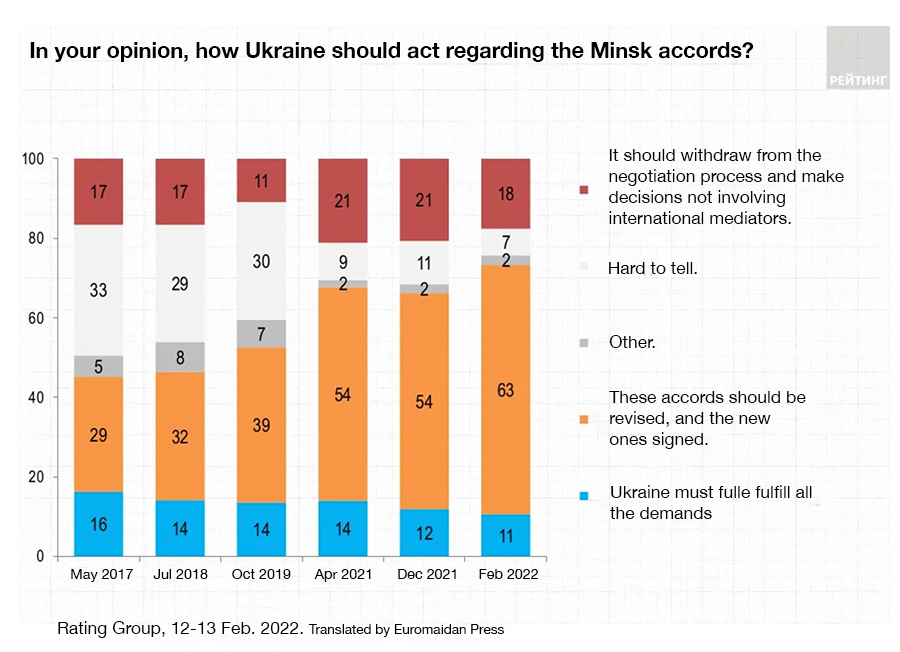
Most of the pollees (67%) said to have a superficial knowledge of the content of the Minsk accords with only 12% claiming to know their content very well.
"One in five is unfamiliar with the content of the agreements, but the figure has fallen from 39% to 21% in the last four years," Rating Group notes.
Additionally, a majority of Ukrainians are in favor of Ukraine withdrawing from the Minsk agreements if Russia recognizes its proxy statelets as independent states. There are signs that such a scenario is on the table in the Kremlin: the poll was conducted days before Russia's Duma asked Putin to recognize the Luhansk and Donetsk "People's Republics."
"55% of respondents believe that Ukraine should withdraw from the Minsk agreements if Russia recognizes the so-called DNR and LNR as independent states. 24% are against it, while 21% are undecided on this issue. The majority of the population, regardless of their region of residence and their age, is in favor of withdrawing from the Minsk agreements under the mentioned conditions. A noticeable difference emerges only in the electoral perspective: the majority of the surveyed voters of the 'Opposition Platform – For Life' and 'Nashi' political parties are either against withdrawing from the Minsk agreements or are hesitant to respond," Rating notes.
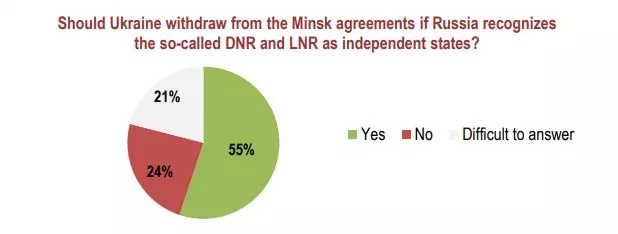
Russian Duma urges Putin to recognize Donbas puppet statelets. Is the Minsk peace deal dead?
Since the beginning, many Ukrainians saw the accords as a road to Ukraine's capitulation since those had paragraphs unacceptable to Ukraine. However, the deal turned out to be a double-edged sword with other paragraphs impossible to fulfill for Russia. This led to an impasse in the Minsk process lasting to this day, with Ukraine demanding that Russia withdraw all of its forces from the Donbas, and Russia demanding Ukraine's direct negotiations with Russia's puppet stateless of Luhansk and Donetsk "people's republics" ("LNR" and "DNR").
The majority of surveyed Ukrainians (57%) blame Russia for the fact that the Minsk accords don't work. Another 10% put blame on the representatives of the so-called "LNR/DNR." Only 12% blame Ukraine, and the other 12% could not answer who is to blame.
The same Rating poll showed record-high support for Ukraine's NATO and EU membership.
62% of respondents support Ukraine’s accession, while 30% do not support it. Since 2014, there has been a steady increase in the support for accession
to NATO, Rating notes.
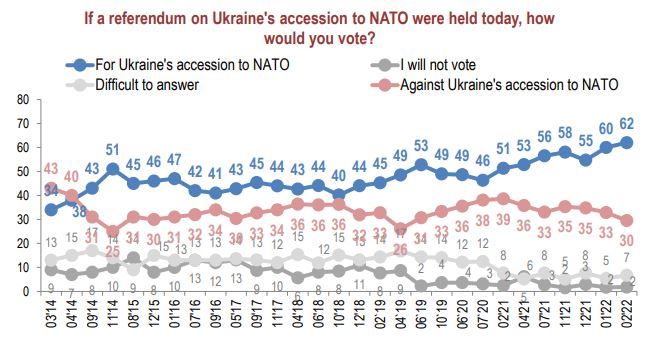
68% of respondents support joining the European Union, while 24% do not. As in the case of NATO, the support for the EU accession has increased over the past two months, reaching the highest level in the survey history since 2013.
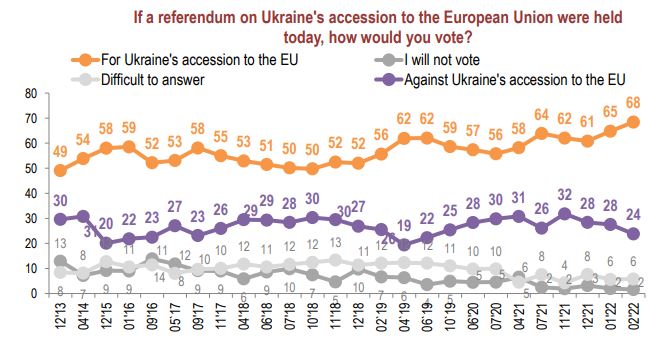
"The respondents from western and central Ukraine support the idea of Ukraine's integration into the Western structures more, while those from the South support it less. In the East, there are fewer supporters of NATO membership than there are opponents. As for the EU, there are equal parts of its opponents and supporters in the eastern regions.
Over the last few years, there have been no significant differences in age demographic groups regarding their assessment of Ukraine's foreign
policy direction. In the electoral perspective, the rejection of Ukraine's accession to Western structures prevails only among the voters of the “Opposition Platform – For Life” political party and Murayev's “Nashi” party," Rating notes.
The Rating Group conducted the poll using the CATI (Computer Assisted Telephone Interviews) methodology on January 12-13 among 2,000 adult respondents from all Ukrainian regions except the Russian-annexed Crimea and the temporarily occupied territories of the Donbas. The sample error of the study doesn't exceed 2.2%.
Read more:
- Russian Duma urges Putin to recognize Donbas puppet statelets. Is the Minsk peace deal dead?
- How Ukraine can escape the trap of the Minsk Protocols and return to international law
- Ukraine-Russia peace talks are in a stalemate as Kyiv eyes ways to revise Minsk deal (2020)
- The curtain falls on a Russian-OSCE charade in Ukraine
- What would happen if Ukraine implements the controversial Steinmeier formula for Donbas?
- 58% Ukrainians support joining EU, 54% in favor of NATO, IRI Ukraine poll shows
- More than one Ukrainian in four speaks Polish, new survey finds
- Poll results: Slight improvement amid national pessimism in Ukraine, positive local outlook (2017)
- Three-fourths of Ukrainians oppose Minsk accords in current form, poll shows (2021)
- Russia issued ultimatum to Ukraine — Kuchma (2015)

